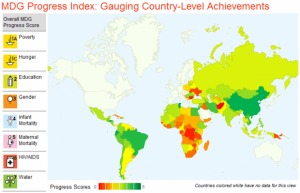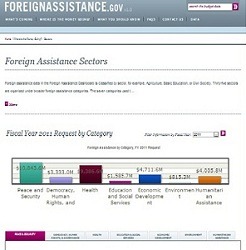Blog
Posted on February 1, 2011
On January 24th, Michelle Bachelet announced a 100-day action plan for U.N. Women, a newly-formed agency for promoting gender equality and the empowerment of women around the globe. “Women’s strength, women’s industry, women’s wisdom are humankind’s greatest untapped resource,” said Bachelet, a former president of Chile and executive director of the fledgling agency.
Bachelet laid out five priorities for U.N. Women: enhancing women’s leadership and participation; ending violence against women; supporting women’s role in peace and conflict resolution; bolstering economic opportunities for women; and placing gender equality high on the agenda of national, local and sectoral planning and budgeting. She also discussed five core principles for the agency: enhancing implementation of international accords by national partners; backing intergovernmental processes to strengthen the global framework on gender equality; advocating gender equality and women’s empowerment; promoting coherence with the UN on the issue; and acting as a global broker of knowledge and experience.
U.N. Women—which is officially called the United Nations Entity for Gender Equality and the Empowerment of Women—was established by the general assembly last year, merging four former U.N. entities into one. The main functions of the agency are to support inter-governmental bodies in their formulation of policies and standards as they relate to women; to assist U.N. members in the implementation of those standards through technical and financial support as needed and by creating effective partnerships; and to provide accountability to the U.N. for its own commitments relating to gender equality.
Bachelet’s remarks came during the inaugural session for the agency’s executive board. U.N. Women’s formal launch will be February 24th, 2011.
For more information on U.N. Women and the 100-day action plan, please visit:
Posted on January 24, 2011

The Center for Global Development recently released a new online interactive map tool to gauge progress towards the Millennium Development Goals (MDGs) at the country level. Through this tool, the CGD ranks countries on their overall progress on the 7 indicators with a score of 1-8. When you click on a country, you will see seven graphs showing observed progress on each of the indicators against the required progress to meet the goals by 2015. The seven indicators are: halve extreme poverty (people earning under $1.25/day); halve the proportion of the undernourished population; achieve universal primary education; achieve gender parity in schooling; reduce child mortality by 2/3; reduce maternal mortality by 3/4; halt and begin to reverse the spread of HIV/AIDS; and halve the proportion of people living without access to safe drinking water.
Four countries are tied for best progress to date, with a score of 7: China, Ecuador, Honduras, and Tunisia. The next few countries in the top 10 performers include Brazil, Egypt, Iran, Jordan, Kyrgyz Republic, Laos, Lebanon, and Vietnam, with scores of 6 to 6.5. The worst performers, ranked in the 130s, include Burundi, Bulgaria, Congo-DRC, Marshall Islands, Afghanistan, and Guinea Bissau.
The map also shows which countries are the best and worst performers in each of the seven indicators. A quick glance at the map shows the most progress globally in access to safe drinking water, and the least progress in halting and reversing the spread of HIV/AIDS.
Posted on December 23, 2010
Following the release of several other federal dashboard information websites earlier this year, the Department of State and USAID have launched the Foreign Assistance Dashboard on December 16, 2010. Like other federal dashboards, the Foreign Assistance Dashboard was created in response to Obama’s Open Government Initiative – for which he signed the Memorandum on Transparency and Open Government on his first day in Office. The initiative aims to create openness in the U.S. government as well as engaging public trust by establishing “a system of transparency, public participation, and collaboration.” Besides ensuring greater accountability in government spending, another major objective of the Foreign Assistance Dashboard is to enhance foreign aid effectiveness and efficiency. The creation of this dashboard is also a part of U.S. commitment to the Paris Declaration on Aid Effectiveness and the Accra Agenda for Action.
The Foreign Assistance Dashboard ties in very nicely with the recently issued Quadrennial Diplomacy and Development Review (QDDR), which highlights the importance of embracing transparency for achieving efficiency and effectiveness in foreign aid investments. The goal of the dashboard is also consistent with Global Washington’s policy recommendations, Global Development through Aid, Partnerships, Trade and Education, which includes transparency and accountability as one of its four principles on aid effectiveness.
So, what does the Foreign Assistance Dashboard do and how does it work? Let’s look at several key features:
| |
 |
 |
- • By Country – users may use maps to track where the money is going. You may, for example, click on a particular country to see how much funding the U.S. government overseas post receives in a particular fiscal year.
- • By Sector – thirty-five sectors are organized under seven broader foreign aid categories. For example, if you are interested in U.S. foreign aid investments in Economic Development, you will be able to see how much of the $58 billion foreign aid budget has been appropriated for several areas under Economic Development – e.g. Infrastructure, Agriculture, Macroeconomic Foundation for Growth, Trade and Investment, etc.
- • By Initiative – even though not all foreign aid funding is attributable to an initiative, there are three significant interagency targeted initiatives that are highlighted on the dashboard as they all have received “unprecedented investments” from the U.S. government to make improvements in critical development areas. They are the Global Health Initiative, the Global Climate Change Initiative, and the Feed the Future Initiative. You will see detailed funding information for each of these initiatives.
- • Top 10 Things You Should Know – it contains a simple explanation of the goals and limitations of this dashboard, a quick overview of the entire U.S. government budget process, and definitions of what the data means.
- • FAQS – users may find answers to their general and data questions from this page.
I think the Foreign Assistance Dashboard is successful in terms of enabling the public to examine, research, and track foreign aid investments in a standard and easy-to-understand format. The data is shown in very digestible ways of color-coded, 3-D charts and maps, and the data can be searched by country, by sector and by year. The data sets can be further filtered in a variety of ways. However, one thing to note: this dashboard is still in the very early stages of development. The current data only contains foreign aid budget information for the Department of State and USAID, but it aims to integrate all U.S. Government foreign aid budget, financial, program, and performance data. The dashboard does not make any promises on when this next phase will be completed. Hopefully, this will happen very soon. Then, we can have an accurate and full picture of foreign aid spending, and the efficacy of this dashboard can be maximized.


